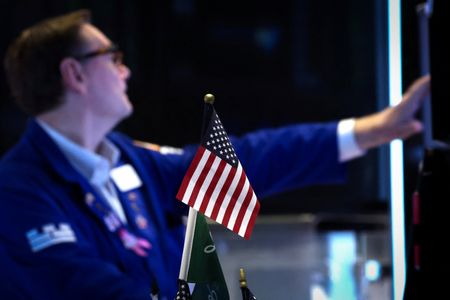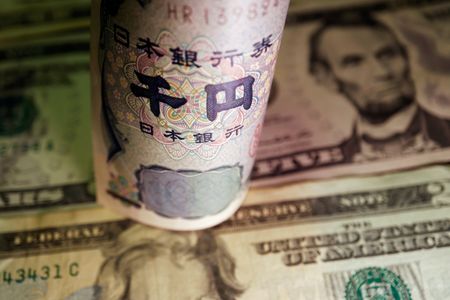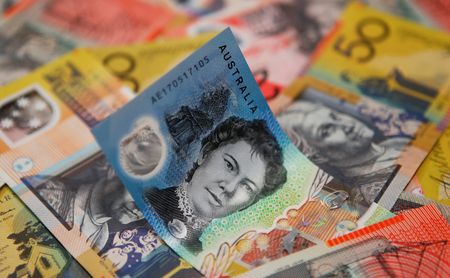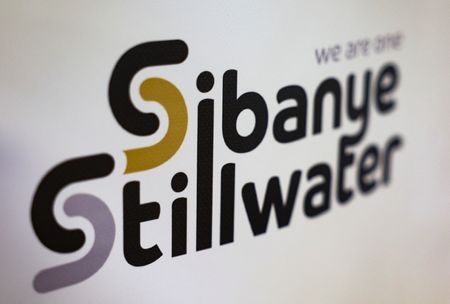By Sinéad Carew and Nell Mackenzie
NEW YORK/LONDON (Reuters) -MSCI’s global equities gauge rallied 1.4% on Monday while government bond yields rose modestly on bets the record-long U.S. government shutdown will soon end, enabling official data releases to resume to provide much-needed clarity on the state of the economy.
The U.S. Senate moved forward on Sunday on a measure to end the shutdown, now in its 41st day, which has sidelined federal workers, delayed food aid, snarled air travel and paused the release of government economic data.
If the Senate passes the bill, which would fund the government until January 30 and include a package of three full-year appropriations bills, it must then be approved by the House of Representatives and sent to President Donald Trump, a process that could take several days.
OnWall Street, the S&P 500 closed up 103.63 points, or 1.54%, to 6,832.43 for its biggest one-day percentage gain since October 13 and the Nasdaq Composite rose 522.64 points, or 2.27%, to 23,527.17 for its biggest daily gain since May 27. The Dow Jones Industrial Average rose 381.53 points, or 0.81%, to 47,368.63.
“There’s an increased willingness to take on additional risk because there’s a possibility the government could reopen some time this week,” said Robert Pavlik, senior portfolio manager at Dakota Wealth in Fairfield, Connecticut. “Right now it’s a bit of a relief rally.”
Pavlik said investors have been concerned by anecdotal evidence of “people staying home and not spending as much” and are anxious for the resumption of official economic reports for “hard evidence.”
“We’ve had this void for so long that it felt like it was starting to really weigh on investors’ minds and people were focusing more and more on valuations,” he said.
MSCI’s gauge of stocks across the globe rose 13.65 points, or 1.38%, to 1,004.97, which would be its biggest daily gain since late June. Earlier, the pan-European STOXX 600 index closed up 1.42%.
While last week’s non-government data stoked worries about a weakening U.S. labor market, a slew of Federal Reserve officials reiterated their preference for going slow on further rate cuts.
St. Louis Federal Reserve President Alberto Musalem said that with inflation closer to 3% than the Fed’s 2% goal, the economy resilient, financial conditions accommodative and monetary policy close to neutral, the Fed should “tread with caution” on any further interest rate cuts.
Traders are pricing in a roughly 64% probability that the central bank will cut rates by 25 basis points next month, according to CME Group’s FedWatch tool.
Still, Fed Governor Stephen Miran said on Monday a 50 basis point rate cut would be appropriate for December, noting that inflation is falling while the unemployment rate is drifting higher.
U.S. Treasury prices fell on Monday, driving yields up as investors favored riskier assets on optimism about an end to the government shutdown.
The yield on benchmark U.S. 10-year notes rose 2.7 basis points to 4.12%, from 4.093% late on Friday while the 30-year bond yield rose 0.9 basis points to 4.7103%.
The 2-year note yield, which typically moves in step with interest rate expectations for the Federal Reserve, rose 3.8 basis points to 3.595%, from 3.557%.
Risk-sensitive currencies including the Australian dollar rose, while safe havens dipped against the U.S. currency, as risk sentiment was boosted by signs the U.S. government is closer to reopening.
The Australian dollar strengthened 0.71% versus the greenback to $0.6537 while New Zealand’s kiwi strengthened 0.32% to $0.5644 and the Canadian dollar gained 0.22% to C$1.402 per dollar.
But against the Japanese yen, the dollar strengthened 0.46% to 154.11 and the euro was down 0.05% at $1.1559.
In cryptocurrencies, bitcoin gained 1% to $105,550.98.
Safe-haven gold hit its highest level in more than two weeks as investors bet on rate cuts after signs of economic softening last week while a weaker dollar lent support.
Spot gold rose 2.82% to $4,111.58 an ounce. U.S. gold futures rose 2.72% to $4,108.20 an ounce.
Oil prices ended higher on Monday after swinging between gains and losses during the session as analysts focused on potential fuel supply disruptions from fresh U.S. sanctions and Ukrainian drone attacks on Russian refineries, although predictions of a crude supply surplus kept gains in check.
U.S. crude settled up 0.64%, or 38 cents at $60.13 per barrel and Brent settled at $64.06 a barrel, up 0.68%, or 43 cents.
(Reporting by Sinéad Carew, Nell Mackenzie and Rae WeeEditing by Lincoln Feast.)











